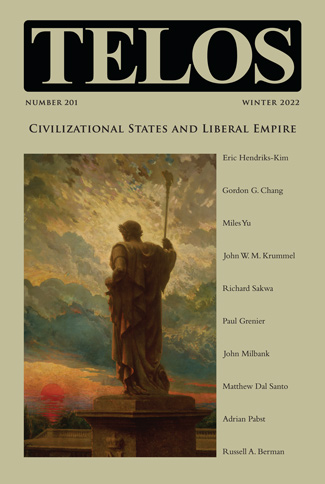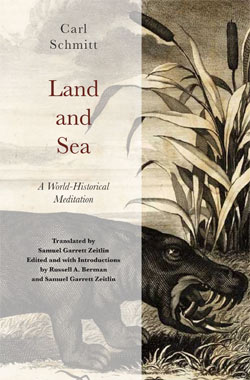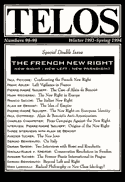In today’s episode of the Telos Press Podcast, David Pan talks with Eric Hendriks-Kim about his article “The Polemics of China’s Counter Cosmopolitanism,” from Telos 201 (Winter 2022). An excerpt of the article appears here. In their conversation they discuss the impetus behind the current proliferation of Chinese theories of cosmopolitanism; how these new ideas about cosmopolitanism fit into a history of anti-Western forms of universalism in various parts of the world; the idea of tianxia, its meaning and history, and how it is used today; how Jiang Shigong’s idea of socialism with Chinese characteristics differs from the theories based on the idea of tianxia; how Jin Huimin conceives of the relationship between universalism and particularity; the relationship of these Chinese notions of cosmopolitanism to Western notions of cosmopolitanism; and whether any of these conceptions escape from an imperialist perspective. If your university has an online subscription to Telos, you can read the full article at the Telos Online website. For non-subscribers, learn how your university can begin a subscription to Telos at our library recommendation page. Print copies of Telos 201 are available for purchase in our online store.
|
In today’s episode of the Telos Press Podcast, Camelia Raghinaru talks with Qin Wang about his article “Constitution and Literariness: Takeuchi Yoshimi’s Critique of the Postwar Japanese Constitution,” from Telos 189 (Winter 2019). An excerpt of the article appears here. If your university has an online subscription to Telos, you can read the full article at the Telos Online website. For non-subscribers, learn how your university can begin a subscription to Telos at our library recommendation page. Purchase a print copy of Telos 189 in our online store. As the world becomes increasingly more focused on the second coronavirus wave and the American elections, Erdoğan’s mercenaries and army will most likely invade Northern Syria again in the coming days and weeks. Erdoğan knows that no regional or global power will seriously challenge him if he occupies the rest of Northern Syria, also known as Rojava. During the last four years, he has seized every opportunity to execute his neo-Ottoman enterprise. He has openly recruited jihadis and occupied three strategic areas in Rojava. As the Syrian Kurds remain the most stubborn obstacle to his regional expansion southward, he has made his intentions to eliminate the semiautonomous administration in Northern Syria abundantly clear. The Trump administration has little concern for the situation in Syria. Dismissing the Pentagon officials’ strong advice, Trump has given in to Erdoğan’s demands in Northern Syria more than once. Erdoğan secured Trump’s implicit approval to attack the Syrian Kurds about a year ago, during a dubious phone call between the two leaders. Given that things might change under a Biden administration, it is safe to assume that the opportunistic Erdoğan has already planned a devastating strike to knock out this secular, semiautonomous, multiethnic entity in Rojava. Telos Press Publishing is pleased to announce that Carl Schmitt’s Land and Sea: A World-Historical Meditation is now available for purchase. Order your copy today in our online store.
Translated by Samuel Garrett Zeitlin Originally published in 1942, at the height of the Second World War, Land and Sea: A World-Historical Meditation recounts Carl Schmitt’s view of world history “as a history of the battle of sea powers against land powers and of land powers against sea powers.” Schmitt here unfolds his view of world history from the Peloponnesian War to European colonial expansion to the birth pangs of capitalism, while polemically setting Nazi Germany as a continental land power against Britain and the United States as its maritime enemies. In Land and Sea, Schmitt offers his interpretations of the rise of Venice, piracy, “corsair capitalism,” the spatial revolution of European colonial expansion, the rise of the British empire, and his readings of thinkers as diverse as Seneca, Shakespeare, Herman Melville, and Benjamin Disraeli. This new and authorized edition from Telos Press Publishing, translated by Samuel Garrett Zeitlin and edited by Russell A. Berman and Samuel Garrett Zeitlin, includes extensive textual annotations that compare critical variations between the original 1942 edition of Land and Sea and the subsequent editions published in 1954 and 1981. As an occasional feature on TELOSscope, we highlight a past Telos article whose critical insights continue to illuminate our thinking and challenge our assumptions. Today, Beau Mullen looks at Alain de Benoist’s “The Idea of Empire,” from Telos 98–99 (Winter 1993/Spring 1994). |
||||
|
Telos Press Publishing · PO Box 811 · Candor, NY 13743 · Phone: 212-228-6479 Privacy Policy · Data Protection Copyright © 2024 Telos Press Publishing · All Rights Reserved |
||||


 Few political concepts have appeared as destined to be cast into history’s dustbin as that of empire. The nation-state is the most widely accepted model for sovereign territories, and imperial ambitions of nations are often condemned by the international community. The existence of great empires, such as that of the Romans or of the Holy Roman Empire, it appears, are simply regimes that are relics of a distant, less enlightened historical era. The areas once encompassing the great empires have now fractured into sovereign nation-states, each with its own polity and allegiances. Furthermore, serious modern confederation between nations is most often based on monetary concerns, not the furtherance of any imperial goal or ambition. The sun, it could be said, has set on the idea of empire.
Few political concepts have appeared as destined to be cast into history’s dustbin as that of empire. The nation-state is the most widely accepted model for sovereign territories, and imperial ambitions of nations are often condemned by the international community. The existence of great empires, such as that of the Romans or of the Holy Roman Empire, it appears, are simply regimes that are relics of a distant, less enlightened historical era. The areas once encompassing the great empires have now fractured into sovereign nation-states, each with its own polity and allegiances. Furthermore, serious modern confederation between nations is most often based on monetary concerns, not the furtherance of any imperial goal or ambition. The sun, it could be said, has set on the idea of empire. 






